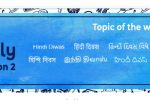JOHN MOLSON MBA International Case Competition
- Viewed - 1619
About
About
At a glance
The John Molson MBA International Case Competition is a not-for-profit event organized by a team of MBA candidates from the John Molson School of Business at Concordia University in Montreal, Canada. The competition is open to top business schools worldwide, and is recognized as the largest case competition of its kind. Its main purpose is to bridge the gap between corporate and academic worlds, which ultimately enriches both students and executives alike.
The competition format is a round-robin tournament consisting of seven unpublished business cases. The cases are selected from among the top entries from the annual Case Writing Competition. The highlight of the week is a live case presentation by a major company facing a real-life business challenge.
An Educational Experience Unlike Any Other
With up to three hours of preparation time, teams of four students must analyze and evaluate unpublished business cases using the skills, knowledge and experience they have acquired from their respective MBA curriculum. Students rely on their own abilities and limited use of Microsoft Office software, with no access to the internet. The final product is a presentation in PowerPoint format whereby students’ demonstrate their ability to dig into a problem and develop a feasible solution.
The students must then present their detailed plan of action to a panel of judges. More than 300 business executives serve as judges, using their unique backgrounds, experiences and perspectives to critically assess the participants’ presentations. Teams are evaluated on creativity, insight, substance and plausibility of implementation.
Live Case
The Live Case is truly an exciting opportunity for students to evaluate a timely business issue and present ideas directly to an enterprise in need of solution
Read more about it here.
The Richard Outcault Team Spirit Award
The Richard Outcault Team Spirit Award, was introduced in year 2000 to honour the memory of the late Richard Outcault, a former competitor at the John Molson MBA ICC. Richard Outcault was a member of the Northeastern University team in ’98. Three days before the start of the competition, Richard’s father suddenly became terminally ill. However, Richard remained positive, and in accordance with his father’s dying wish, he left his father’s side to compete in the competition. Richard joined his team in Montreal just in time to experience the Great Ice Storm of 1998. In spite of all these tribulations, the Northeastern team took first prize that year! Richard missed the award ceremony to attend his father’s funeral. The story only gets more grim as – in 2000 – Richard succumbed to a rare illness.
Those who knew Richard at the competition in ’98, most notably his fellow participants, were in awe of his physical and mental stamina, not to mention his humour, creativity, and positive outlook. He truly cherished the “MBA ICC experience” and embodied the “team player” attitude. The Richard Outcault Team Spirit Award was introduced in 2000 by Northeastern University and the organizers of the John Molson MBA ICC to honor Richard’s memory and spirit.
While competing, it’s easy to lose sense of our peers. Each year, we award one team that demonstrates genuine team spirit and collaboration. This award is presented at our Final Banquet.
J. Pierre Brunet Coach Award
The Dr. J. Pierre Brunet Coach Award was created in 2006 to recognize the important contribution that the coaches make to the competition. This include preparing teams for months prior to the competition, and guiding them the week of the competition. Good coaches teach participants a methodology to efficiently tackle complex business problems, and present their recommendations in professional and convincing presentations.
Participants change year after year, but many coaches return – this continuity is beneficial to the competition and to the business schools they represent. They are also champions of the competition in their schools, raising the level of awareness and the enthusiasm of their students for the challenges that lie ahead. We gain valuable insights into the smooth functioning of the competition from coaches who take part in the coaches’ briefings that take place at the beginning and end of the competition week. We also benefit from new coaches who bring fresh ideas to the table each year.
Each year at the competition, we award the coach(es) from a school who demonstrate excellent mentorship. This award is presented at our Final Banquet ceremony. The criteria and selection process evolve with time. As in the past, all the coaches will be canvassed and asked by secret ballot to express their choices prior to final selection. In cases where there isn’t a unanimous consensus, the Board Members decision will prevail.
We thank Dr. Brunet for his unsurpassed contributions to the success of the competition as faculty member, mentor, board member and chair and for the countless other things he has brought to the competition through his dedication, skill, wit, empathy and clear-mindedness.
Rules
1.0 THE COMPETITION
The John Molson MBA International Case Competition (the “Competition”) is organized by a team of MBA students from the John Molson School of Business (the “Organizers”) with the support of student volunteers and a Board of Directors which includes a number of senior executives from the Montreal business community.
2.0 ELIGIBILITY
The competition is open to graduate schools offering an MBA or equivalent program deemed acceptable by the Board of Directors. A student who is registered in at least one course in such a program at his/her school in the fall semester immediately preceding the Competition and who has not previously competed in any John Molson MBA International Case Competition is eligible to participate in the Competition.
3.0 THE TEAMS
Each school must be represented by four students and at least one coach. A student alternate may be included as a fifth member of the team at the discretion of the school. The alternate may only participate for his/her school in extenuating circumstances and with the approval of the organizers. If an alternate steps in, the outgoing participant cannot return for the same case. An alternate who actually competes for his/her school will not be eligible to participate in future competitions.
In the event there are an odd number of schools registered for the competition, a team designated as Team Global will be constituted with four of the alternates who volunteer to do so. If possible, a member of the Team Global will be from a school based outside North America, with the others from American and Canadian schools. A member of Team Global may rejoin his/her team at any time during the competition if circumstances make this necessary. If a team, including Team Global, does not does not have enough members to compete or is unable to participate for any reason deemed acceptable by the organizers, an alternate will be asked to join the team for as long as is necessary in the competition.
Alternates will be asked to volunteer during registration and will be selected at random from the pool of willing alternates if a team global or alternate is needed.
An alternate who participates with a team other than his/her own school will be eligible to participate in future competitions.
4.0 THE CASES
The cases used in the Competition will, to the best of the Organizers’ knowledge, be unpublished and untested. All cases will be selected from submissions made to an annual international case writing competition arranged by the Organizers.
5.0 COMPETITION FORMAT
The 36 teams will be assigned to six divisions. Divisions will be established by a random draw. Each division will have at least two non-North American schools. Non-North American schools will be assigned to divisions first, followed by the American schools and then the Canadian schools.
Each team will compete one on one in the five cases during the round robin phase of the Competition against the other teams in their division, as scheduled by the Organizers. The divisional winners will be the team with the highest number of wins in their division. Nine teams, comprised of the six division winners and the three wildcards (those with the highest match point accumulation during the round robin phase), will advance to the semifinals. In the unlikely event that a non-qualifying team has a higher number of wins than one of the wildcard winners, the non-qualifying team will be awarded a wildcard, replacing the wildcard team with the lowest number of match points. Please refer to the section on Scoring.
The nine teams in the semifinals will be divided into three groups based on total match point accumulation during the round robin phase. Group One will consist of teams ranked 1,6 and 9 in match point accumulation; Group Two will consist of teams 2,5 and 8, and Group Three will consist of teams 3,4 and 7. The winning team from each of these semifinal groups will compete in the finals.
6.0 CASE PREPARATION
Teams will ordinarily have three hours to read and analyze the case and to prepare exhibits in support of a 25-minute oral presentation to a panel of Judges. Preparation and presentation time for case three is 90 minutes and 15 minutes, respectively. No written analysis is required. Each team will be assigned a workroom for their preparation period as well as a team host who will supervise the team during the preparation period and escort them to the presentation room at the end of the preparation period.
The preparation room will be equipped with:
2 PC laptops
MS Office 2016 Pro Plus including Microsoft Word, Excel, and PowerPoint on each laptop (available in French and English)
The following items are not permitted in the preparation room:
Cell Phones
Programmable Calculators
Personal Electronics (Tablets, PDAs, Smart Watches, MP3 Devices, Recorders and Additional Computers)
Memory Storage Device (Portable hard drive and Additional USB Flash Drives)
Bags, Backpacks, Books and Documents
The use of Internet is not permitted, and hence, the laptops will not have any Internet capabilities.
Participants are allowed to bring dictionaries to the competition.
Teams are expected to use PowerPoint for preparing slides and presentations. Use of animations, video or audio features will not be permitted and neither will any add-ons to standard PowerPoint features. Manual animation of slides or building of slides (bringing in one bullet at a time or one element at a time) is allowed. The use of graphics beyond what is available in the Microsoft Office package is not permitted. However, charts and tables are permitted provided that they are created using tools available within Microsoft Office.
There are no limits to the number of slides and exhibits used to support the presentation to the Judges. The relevance, clarity, and cohesiveness of the exhibits will be a factor in the Judges’ evaluations. Additional exhibits may be prepared at the team’s discretion in anticipation of questions from the Judges’ panel. Cue cards and personal notes are allowed for use by the teams during their presentations. All exhibits must be prepared during the allocated preparation time and no material prepared prior to the Competition is permitted.
At the end of the preparation time, teams will copy all presentation material to their designated file on the laptop and USB key. A copy of the presentation files will be emailed to the coaches after the end of the day. During the period between the end of preparation time and presentation, the four presenters may continue discussing elements of the case. Communication by the four participants with their coaches, the student alternate or anyone outside of the team other than the team host will not be permitted from the beginning of the case preparation to the end of the question and answer period.
The presentation files will be accessible by the Judges’ panel at the end of the question period to assist them in their deliberations.
7.0 CASE PRESENTATION
Presentations may be made in English or French. Teams will notify the Organizers of the language selected prior to the Competition and will present in the selected language for the entire Competition.
Each team will have a strictly enforced maximum of 25 minutes to present, followed by a 15 minute question and answer period with the Judges’ panel. There will be a ten minute break before the second team’s presentation. The second team will not be allowed in the presentation room until after the question period for the first team ends. The first team may remain in the presentation room during the second team’s presentation. The Organizers will set the order of presentation and each team will present first at least twice during the round robin phase of the Competition.
In the semifinal and final rounds, there will be three team presentations followed by question periods. The team in each grouping with the highest number of match points accumulated during the round robin will have the option of selecting if it wishes to present first, second or third in its grouping. The team with the second highest match point total will be given second choice. As in the round robin, a team cannot attend another team’s presentation until it has completed its own presentation and question period.
Each member of a team is required to participate in the team’s presentation but not necessarily in the question period following the presentation. The teams may not interact during the presentations nor should there be any communication with the audience. Teams may record their own presentations. The Organizers may record any presentation for purposes of promoting the Competition.
8.0 JUDGES
Judges are members of the business community selected by the Organizers and the Board of Directors. Panels are constituted at the discretion of the Organizers and will include at least three Judges, one of whom will be designated Lead Judge. The Lead Judge will chair the question period, lead the deliberations and prepare the evaluation form for each team once the result has been determined. Each team in the semifinals will receive a copy of the evaluation form after deliberations have been completed. Judges have a maximum of one hour to render their decision in the round robin phase. There are no deliberation time limits in the semifinals and finals. The panel’s decision is final.
9.0 SCORING
During the round robin, the panel will evaluate each of the two teams in five evaluation categories, providing a numerical rating of 1 to 10 for each category. Each category is weighted differently, and the relevant multiplier, when applied, will give the weighted score for that category:
In addition to their allocated 11-point split, the winning team will receive an additional 30 match points, except in the event of a 6-5 split wherein the winning team will receive an additional 20 match points and the losing team will receive an additional 10 match points.
Any team that has not arrived at the preparation room at its appointed time will not be given any extra time for that round.
There is no match point allocation in the semifinals and finals. The Judges will declare a winner in each of the semifinal contests. The three winning teams will then participate in the finals. The Judges decision regarding the first, second and third place winners will be announced at the closing banquet.
9.1 TIE BREAKING
In the event two teams in a division have the same number of wins at the end of the round robin, the divisional winner will be the winner of the contest between the two teams during the round robin.
If more than two teams are tied, the winner will be the team with the best record in the contest between them in the round robin. If teams are still tied, the winner will be the team with the highest number of match points accumulated during the round robin.
In the event teams are tied for the last semifinal position, the semifinalist will be selected with the application, in sequence, of the following criteria: a) the winner of the contest between the teams; b) the team that defeated the first place team in their division; c) the team with the highest cumulative evaluation score for case 5; d-g) the team with the highest cumulative evaluation score for each preceding case, in reverse order. The same process will be applied to determine the ranking of the semifinalists.
10.0 GENERAL
The Competition is intended to provide a learning experience for the students that will encourage healthy competition, professionalism and interaction by our future business leaders, both amongst themselves and with our business community. The Rules and Guidelines are not all encompassing and situations may arise that have not been covered. It is the expectation of the Organizers and of the Board of Directors that any issues or disputes will be resolved in the spirit of the Competition.
NOTICE:
Any concerns or disputes regarding the implementation of these rules must be brought to the immediate attention of the organizer responsible for the schools. In the event of a discrepancy between the English and French rules, the English version will take precedence over the French. In exceptional circumstances, a body made up of at least one of the organizers and the chairperson of the competition advisory board or his assignee and at least two other members of that board will be available to settle disputes.
However, please note that THE DECISION OF THE JUDGING PANEL IS FINAL, AND IS NOT SUBJECT TO REVIEW
Features
Registration
Start Date -2nd January 2022
Final Date - 8th January 2022
Location / Contacts
- Phone : (514) 848-2424
- Website : https://mbacasecomp.com/





Add Review